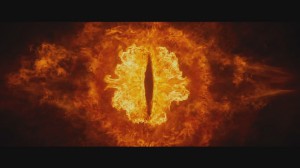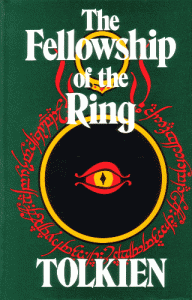 Over at The Guardian, Sarah Crown discusses why she rates Sauron in The Lord of the Rings as the most frightening and enduring villain of all literature.
Over at The Guardian, Sarah Crown discusses why she rates Sauron in The Lord of the Rings as the most frightening and enduring villain of all literature.
I think there could be something to this. I recall vividly just how much Sauron’s unseen — yet uncannily tangible — menace frightened me as a teenager reading The Fellowship of the Ring late into the night, especially whenever I reached the following passage from The Mirror of Galadriel.
But suddenly the Mirror went altogether dark, as dark as if a hole had opened in the world of sight, and Frodo looked into emptiness. In the black abyss there appeared a single Eye that slowly grew. until it filled nearly all the Mirror. So terrible was it that Frodo stood rooted, unable to cry out or to withdraw his gaze. The Eye was rimmed with fire, but was itself glazed, yellow as a cat’s, watchful and intent, and the black slit of its pupil opened on a pit, a window into nothing.
Then the Eye began to rove, searching this way and that; and Frodo knew with certainty and horror that among the many things that it sought he himself was one.
Perhaps part of it was the disturbing uneasiness of that particular 1970s hardcover edition (see below) that I had to gaze upon every time I cracked opened the novel. Still, even now, that passage retains a creepy sense of threat — of something inexorable and inescapable.
Anyway, I’ve rambled enough. Read on and enjoy!

Baddies in books: Sauron, literature’s ultimate source of evil
by Sarah Crown
A really bravura villain grabs you by the throat. From childhood bogeymen via the dastards and arch-nemeses of adolescence, all the way to adulthood’s more nuanced sociopaths, schemers and political tyrants, they’re the grit that makes literary pearls, the dynamos who keep us reading – and part of their appeal is their infinite variety: there are as many brands of evildoer as there are stars in the sky, fish in the ocean. Collectively, they adhere to a modified version of the Anna Karenina principle: all saints are alike; each sinner sins uniquely. How, then, are you supposed to pick a favourite?
In my case, it comes down – in part, at least – to first contact. Assuming we’re among the lucky ones, our initial encounter with evil – with the idea that there are those out there who, given the chance, would do us harm – takes place in the realm of fiction. Fairytales – with their murder, bestiality, suicide, rape, incest and cannibalism – are the obvious jumping-off point. In The Uses of Enchantment, Bruno Bettelheim deemed their unflinching portrayal of wickedness essential to our education – a necessary corrective to “the dominant culture [that] wishes to pretend, particularly to children, that the dark side of man does not exist”.
Certainly, those tangled-wood images of wolves got up as grandmothers and witches in sugar-coated houses retain a disproportionate power to disturb. For me, though, despite a protracted phase during which I hid my Ladybird Sleeping Beauty at bedtime in case the witch climbed out to get me, the baddie who informed my vision of evil – the one against whom all subsequent horrors would be measured – didn’t figure on the cover of a fairytale book. His defining feature is that we never lay eyes on him.
When I was five, my child-of-the-60s father decided he could wait no longer to share with me the joys of JRR Tolkien’s The Hobbit. When I was six, we moved on to The Lord of the Rings. This involved, he tells me, a fair amount of paraphrasing; it quickly became clear that, if he intended his audience to stay awake, it was sensible to skip over the arts-and-craftsy elvish bits. But from the off, I loved it. I loved the quest narrative’s clarity and against-overwhelming-odds sense of purpose; the hobbits who, my dad informed me, were about my height; the richness and coherence of the universe (it’s possible my six-year-old self didn’t put it quite like that).
I loved the way the magic ring starts off as the world’s niftiest gadget and slowly morphs into something disquieting, then alarming, then purely, world-wreckingly deadly. I loved the battle scenes. I loved Gandalf. And I was reduced to quivering jelly by the book’s baddies.


